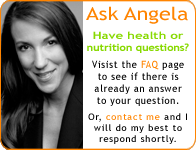We must eat to survive and yet year after year billions of dollars are spent on diet books looking to restrict us from the foods we love, reduce our calories and remove us from the patterns that were giving us comfort. We know diets don’t work, but since we weren’t taught healthy relationships as children, most people don’t know how to listen to themselves.
“I was taking on too much responsibility, doing too much for others, working too hard, not taking care of myself. I was eating too much and rarely exercising. Most days I’d rush out the door in the morning without breakfast. By the time the evening rolled around I felt out of control with my eating. I would snack and snack and then feel guilty about not being able to stick with a plan. I didn’t think my appearance mattered much, but I was definitely in denial about how heavy I had gotten. I used the excuses we all make: "Well, clothing sizes aren’t what they used to be." It wasn’t until I got on my doctor’s scales that I faced the numbers and realized, "I am close to 200 pounds. That’s obese."
Does this sound familiar? It is never too late to develop that sense of connection and trust. It can be reestablished, it just takes practice.
Mindful eating is the first step toward experiencing a healthy relationship with food. Whether you are a person who deprives yourself of foods and eats highly regimented or the slightest bit of anxiety or sadness kick in your carbohydrate cravings, there are ways to stop the cycle of emotional eating.
The first is to gain awareness of your current patterns: How can you get to point B if you don’t know what point A is? This is where most diets fail, because they don’t take into account what a person is presently doing. They don’t address “why” you are eating a certain way before they go and drastically try to change habits and behaviors. The fist step is to identify your patterns, triggers, and eating style.
This goes beyond simply writing down the foods you are eating. You will also need to check in with your feelings every time you reach for food. I am not suggesting that you are an emotional eater 100% of the time. What I am suggesting is that we each need to get in the habit of checking in with ourselves. “Fine” and “ok” will need further probing. We are so used to offering this reply to others when we are asked, “How are you doing?” that we have started to believe it ourselves. Gaining awareness of your eating and emotional patterns is the first step to freeing yourself from the daily restrict-binge cycle.
Categories: Emotional Eating







